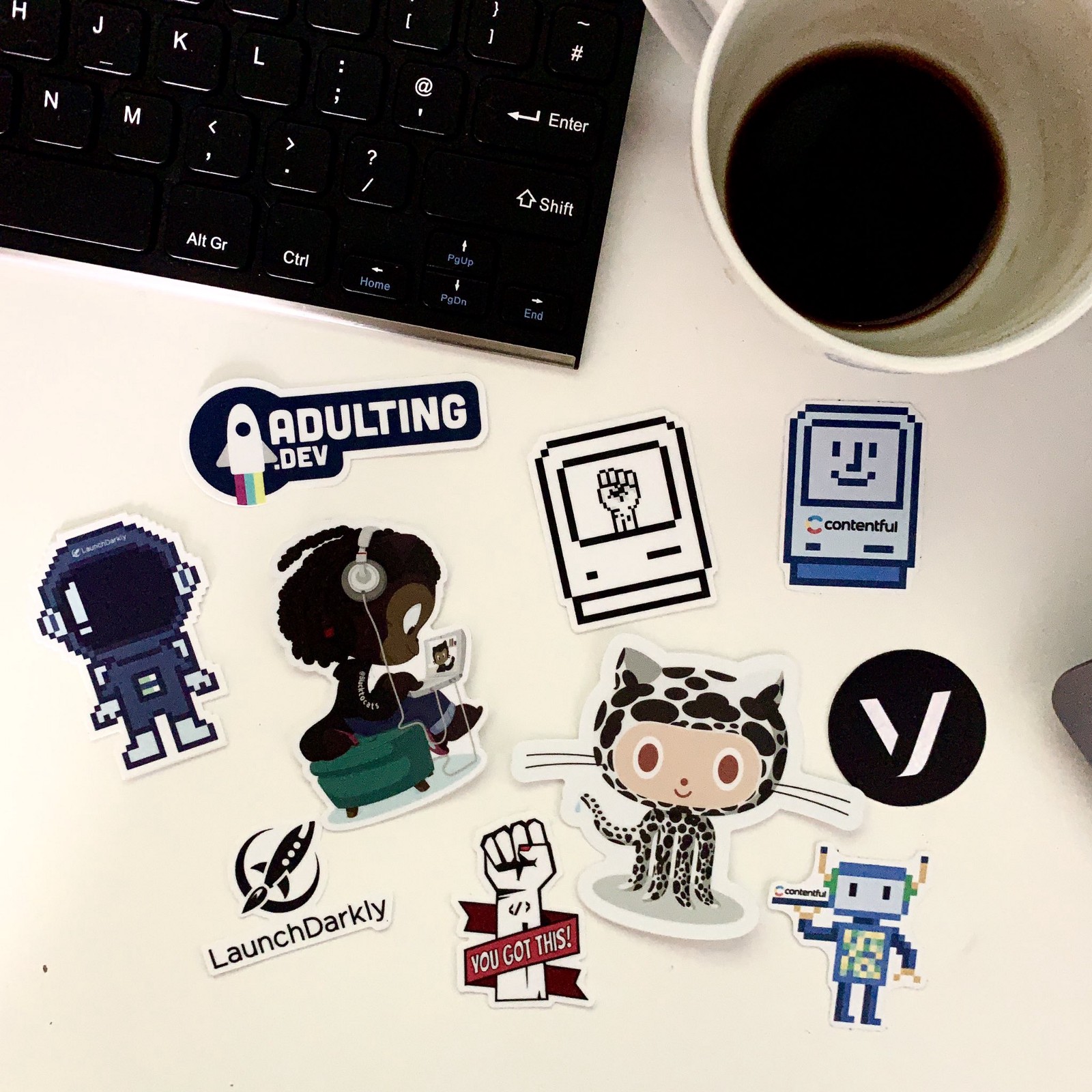My career change journey from charity administrator to software development
February 8, 2021

At the end of 2019, I set myself a crazy goal to learn to code in the hopes of changing careers into software development and after a year, I can't believe I did it!
I couldn't leave my full-time job to do a computer science degree or a bootcamp so instead, I learnt as much as I could through online resources, attended free programming workshops, tech events, and took part in the #100DaysOfCode challenge twice.
Not long after sharing on Twitter my first blog post about my #100DaysOfCode experience, I was furloughed until further notice from my admin job at a charity during a UK lockdown. Despite the uncertainty with my job during a pandemic, I was motivated to use the extra time to continue building projects and work towards achieving one of the scariest goals I've ever set myself. Today I feel so grateful that I'm over halfway through one of the UK's best coding bootcamp, Makers, via their paid apprenticeship programme with Expedia Group as a DevOps Apprentice.
Here's my story on how I embraced the uncertainties of 2020 to land my dream job with some advice if you're curious about changing careers or considering retraining in software development!
A bit about my background
I've always loved the digital world whether it's the web, photography or gaming. As a kid, I'd mess around with basic HTML and CSS on blogging sites for hours after school. I never really understood the code but I loved messing with it until I could make the website look "good".
Coming from a first-immigrant generation family and as the eldest child, there was pressure to study particular subjects to meet family expectations. Studying a creative subject or IT wasn't one of them. I was actually set on doing a degree in photography until my dad convinced me otherwise! The next best thing as a compromise was Psychology and Sociology, which I graduated in at Brunel University and ended up enjoying. However, after graduating, I still wasn't sure what I wanted to do. I loved psychology but it wasn't something I was passionate enough to pursue as a career.
For the next six years, I fell into administrative/finance roles within the education and charity sectors while figuring out what my passion was. By this point, making websites was a distant memory.
I joined a small charity focused on head and neck cancer research working on socially-impactful projects for over four years as a clinical researcher and eventually as a senior administrator. I can get quite restless when I'm in my comfort zone for too long so I always looked for new things to learn at work that would benefit my personal development as well as the organisation. I decided to focus my efforts on improving the charity's website and web design by learning WordPress so that I could change the content management system to something more user-friendly for our small team to all use. No surprise, I loved the project! As soon as I messed around with the HTML and CSS on WordPress, something clicked for me and the inner-child in me that loved creating websites for hours after school reignited. I realised that web development was something that I wanted to dive deeper and do every day.
The start of my coding journey

Change happens when the pain of staying the same is greater than the pain of change." — Tony Robbins
This quote hit the core deep when I first read it so I kept this quote at the top of my Notion app to remind me every day why I was doing this.
I started learning to code in the evenings and weekends, and eventually for most of the day every day after being furloughed in April 2020. After researching how to get into web development, almost every article suggested learning HTML, CSS and JavaScript. The creative part of front-end development appealed to me so this was perfect. To keep me accountable to code daily while balancing a full-time job, I built the habit to code by taking part in the #100DaysOfCode challenge, which I highly recommend to anyone to start as you learn with a great supportive community of coders. (Fun fact: it takes roughly 66 days to form a new habit according to author James Clear!)
Online courses
FreeCodecamp & Codecademy
I started using freeCodeCamp and Codecademy. My personal preference is freeCodeCamp as I feel there's less hand-holding and it encourages you to do a lot of 'googling' to find your answers. The curriculum also provides a great learning structure with five projects at the end of each section to test your knowledge. If you're more interested in back-end programming, they've recently added Python and Machine Learning to the curriculum. I worked through the Responsive Web Design, JavaScript Algorithms and Data Structures and Front End Libraries Certifications. By this point, I was hooked with the problem-solving aspect of coding and wanted to keep writing code to make my laptop do things!
Udacity
I wanted to try other resources to learn web development and had heard lots about Udacity. There are free and paid courses depending on what you want to learn. One of my favourite free courses is the Version Control with Git. It's a great beginner's course and an essential skill for all developers to know and be comfortable in using. Employers will often look on Github to see your work so I started using version control very early on to save my projects.

I decided to give the Front End Web Developer Nanodegree a try since they were doing 50% off their paid courses during the pandemic. The course was challenging and it was a natural progression after learning HTML, CSS and JavaScript on freeCodeCamp. I learnt how to set up a server using Node.js and Express, use build tools to manage asset files, interact with APIs, simplify CSS stylesheets with Sass and write meaningful README files. One of my favourite projects from the nanodegree was building a Node.js/Express web app that uses a Natural Language Processing API to analyse blog articles to determine the author's emotions - you can check it out here.
YouTube
I supplemented my learning with many YouTube videos and still refer back to them today. Whether it's to follow a tutorial on how to create a full website, build a candy crush game in JavaScript, learn how to use a code editor, how to use git or to understand a programming concept, I owe it to these channels for their straight-to-the-point content
- Traversy Media
- The Net Ninja
- The Coding Train
- Kevin Powell
- Web Dev Simplified
- Code with Ania Kubów
- Dev Ed
Code First Girls and Codebar
I love being part of a community as learning every day in your room by yourself can get isolating, especially when you're stuck on a problem. I reached out to a friend working in the industry in September 2019 who shared valuable guidance, which set me on a path to supplement my self-learning by attending coding workshops and courses run by non-profit organisations such as Code First Girls and codebar.
I joined the Code First Girls community and completed both 8-week courses in Web Development and Python in the evenings. I thoroughly enjoyed learning with other women also learning to code and have made some great connections as a result. Learning Python also helped consolidate some of the programming concepts I was learning in JavaScript such as variables, methods and data structures. You begin to see similarities between languages.
Codebar is another great community that aims to make coding accessible to people from all walks of life. They regularly hold free workshops (currently virtual) where you can work with a coach to go through their tutorials or attend with a project of your own to get help on.
Tech events
These are great opportunities to learn about what's happening in tech, learn new skills, pick up heaps of free stickers, learn about job opportunities, and most importantly to speak with other developers.

Early on in my coding journey, I travelled at 6 am for 2.5 hours from London to Birmingham to attend the 'You Got This Conference' aimed for junior developers by myself, and it was one of the best decisions I've ever made. I wasn't sure if I was smart enough to go as well as not knowing anyone but I left that day feeling super inspired by all the speakers, the connections I made and the overall welcoming atmosphere. I was more motivated after hearing stories of those that also career-changed into tech. It quietened my doubts and reminded me of why I was pursuing this path.
If there's one advice that I could give, it's to attend tech events and network as much as possible! I originally heard about my apprenticeship programme at a Code First Girls careers event before it advertised publicly so it's definitely worth checking these out to learn about potential job opportunities for aspiring developers. Most events are currently remote and are often free so keep an eye out on Twitter and the events page of these organisations in particular:
Finding a job
I don't think I ever felt "ready" to apply for jobs. The lengthy requirements in job descriptions intimidated me, which fed into my thoughts that I wasn't ready. I eventually realised that you're never really ready technically until you start working as a developer professionally. As long as you're passionate about coding, love problem-solving, enjoy working in a team, have a curious mindset and have empathy, then I'd say you're ready.
I took the selective approach and applied for Front-End Developer roles and software development paid programmes that accepted career changers. I also looked for companies that valued mentorship and investing in their junior developers' growth.
I kept track of my applications using a table on Notion and applied for 23 openings over three months. I was thrilled that three companies took a chance on me and I made it through to the interview stages. The first was for a Junior Front-End Developer role; the second was an academy programme involving a 12-weeks software engineering training to join a project team after; lastly, a paid apprenticeship programme for an international company with 12-weeks training at a bootcamp. Third time lucky, I accepted the latter and it was the best possible outcome for me so I'm grateful to my current employer for giving me this amazing opportunity to start a new career.
All three interview processes were different. It varied from an informal 'get-to-know' cultural fit chat to multiple stages with take-home coding tests, pair-programming sessions with other candidates and behavioural-based interviews.
My learnings from interviews
I absolutely hate interviews. I'm a ball of anxiety under the spotlight but the thing that helped me manage the nerves was to over-prepare and remember my reasons for making this change. Queue Eminem…
"If you had one shot
Or one opportunity
To seize everything you ever wanted
In one moment
Would you capture it
Or just let it slip?"
In addition to preparing for technical questions, there are five main things that I learnt from my interview experience:
- Know your why! Why do you want to be a software developer? What is it about technology that excites you? Why do you want to change careers?
- Prepare for common behavioural interview questions following the STAR method. If you're changing careers into a completely new field like tech, you have transferable soft skills! Think about evidence of good communication, taking the initiative to solve a problem, managing projects/tasks through to completion, and dealing with challenges of working in teams and how you dealt with it with compassion.
- Practice, practice, practice! I asked my partner to fire common interview questions at me and this was incredibly helpful. Remember to highlight how you can bring value to the team.
- Research the company and explore their website. Understand their core values, what sets them out from their competitors and what goals they are working on. When the interviewer asks whether you have any questions for them, this is a good time to show you've done your research by asking them questions based on company articles you might have found interesting. It shows you're also thinking about the bigger picture and it's not just a job for you.
- The company has given you a chance for a reason so don't underestimate your abilities. I struggle with being confident at the best of times and it shows through in my response. Stay positive and trust the process.
Upon reflection of changing careers into tech…

It's been a crazy journey so far and I'm so excited to continue taking my learning to the next stage in 2021. These are some of the main things that helped me stay motivated during the process of a career change in a pandemic:
- Do the #100DaysOfCode challenge! It's a great way to get started with learning with other coders online so you're not alone. The public accountability helps you stay on track to code a little bit each day, even if it's just for 15 minutes (but it's also ok to miss days because of life so don't be too hard on yourself if you miss a day 😊)
- Join tech communities and attend events to talk to others already in the field. This will help you see whether this is a path you want to explore. You may also hear about job opportunities suitable for career-changers.
- Take advantage of the free coding workshops out there. I find learning with others more enjoyable and you learn topics faster through discussion.
- Don't try to learn everything! I wish I learnt this early on. You don't have to be an expert in multiple languages before applying for your first job.
- Regularly look at job descriptions on LinkedIn and Indeed to get an idea of the skills in demand in your area. Don't wait until you meet all the requirements to apply - start applying as soon as you can so you can get a feel of the interview process early on.
- Apply your skills by offering to build someone a website for free. This really helped consolidate the things I learnt from the various online courses. A friend of mine launched a small business during the pandemic and I offered to build her a website with plain old HTML, CSS, JavaScript and Node.js (it's live here if you're curious).
- Practice your problem-solving skills by solving small coding challenges (also known as kata) on Codewars.
- Be persistent and don't give up. You will have frequent moments of doubt and see others progress faster but all progress is linear. Everyone's situation and learning style are different but it is certainly not impossible no matter your background or whatever life throws at you!
Feel free to reach out to me on Twitter — @toowee_ 😃